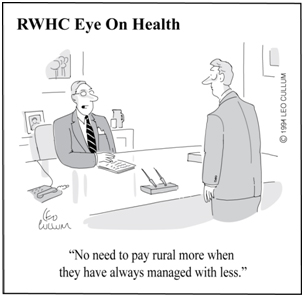
Winter has been long this year. It feels all the more so, given how mild the last two were. It reminds me that blizzards, along with tornadoes and droughts, are part of life in the upper Midwest.
In a similar way, this season of gridlock in Washington is a major threat to rural hospitals’ and physicians’ ability to provide local care and jobs. While the uncertainty may be unprecedented, the threat to rural health is not.
We have been through this before. We will be changed by it; unnecessary damage will be done. But we will adapt and we will survive, stronger for the challenge. Rural health will continue to be provided locally. Rural health will continue to be a major part of the rural economy.
In the late 1970’s, a federally licensed regional health planning council promoted the closure or consolidation of most rural hospitals in southern Wisconsin. The plan was stopped and gave birth to the empowerment of rural communities advocating together through RWHC that continues to this day.
In the mid 1980’s there was an explosion of HMOs (health maintenance organizations) with closed provider networks throughout Wisconsin. They were widely seen as a threat to rural health care. Those health insurance plans have continued to evolve. Rural providers have evolved along with them. RWHC received a “business advisory letter” from the Federal Department of Justice that allows rural hospitals to work, within limits, with health plans as a cooperative. We have learned that it is not just about the price of a particular service but the insurer’s cost “per member per month.”
Medicare’s prospective payment system for hospitals, introduced in the late ‘80s and early ‘90s, was designed for large urban hospitals. It led to hundreds of rural hospital closures. It also led to the birth of Critical Access Hospitals in 1997 and other federal policies recognizing that urban-based payment methods don’t always work to support local access to health care in rural communities.
At the turn of the century, the American health care system was brought to task for poor quality by one of the nation’s top scientific authorities, the Institute of Medicine. The image widely perpetuated was of two 747s’ worth of patients crashing daily. This painful process of becoming more aware of our need to radically improve the quality of American health care led to the now widespread commitment to the triple aim of better health, better care and a lower per capita cost.
It would be foolish to sugar coat the challenges rural providers face today. Deep cuts in federal payments to hospitals and doctors are on the table. A broad array of basic programs that support rural health may be eliminated. While hospitals and clinics are being starved of resources, purchasers of health care are demanding that we invest heavily to change how we deliver that care.
The editor of HealthLeaders sums up the situation pretty well: “Urban hospitals will lose more overall dollars but rural providers will be disproportionately affected because of their thinner operating margins, negligible economies of scale, and a reliance on Medicare funding to provide care for an older, sicker, poorer population.”
With advocacy, like with the weather, bad years eventually follow good ones. During the last ten good years we have unlearned the lesson that rural health advocacy has never been easy. Rural health has always been as much a “cause” or “movement” as a profession. Maintaining the federal support needed to provide quality, affordable care locally is not a job for wimps. It has to be believed in and fought for.
We must fight for fair Medicare and Medicaid payments. Rural must be seen as a priority for the investments government makes in training the next generation of the healthcare workforce.
We rightly complain about a less than perfect and sometimes overly intrusive government, but the alternative–a “free market” distribution of health care–will lead to the demise of small hospitals and clinics in favor of an overly centralized system. We need a functioning government to work with us, not to ignore us, or blindly cut us.
We have many challenges before us. But we can and will prevail. We have done it before, over and over again. Call me naive, but I have yet to see a winter that doesn’t in time lead to yet another beautiful Midwestern spring.